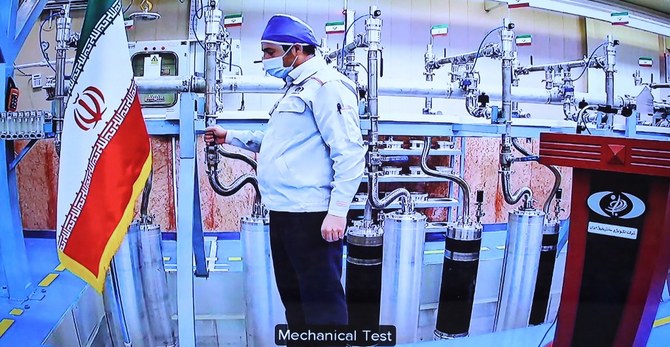
Making concessions to a rogue state only emboldens it to pursue its destructive behavior and policies. This has been the case with the Iranian regime since it was established four decades ago.
Unfortunately, the administration of US President Joe Biden does not appear to have learned this important history lesson. Since Biden assumed office, his administration has made several concessions to the Islamic Republic with the hope that the theocratic establishment will alter its behavior and agree to a revival of the 2015 Joint Comprehensive Plan of Action, also known as the Iran nuclear deal. President Donald Trump withdrew the US from the agreement in 2018.
But with every concession made so far, the Iranian regime has become more intransigent. For instance, after the Biden administration suspended some of the anti-terrorism sanctions on the Houthis in Yemen and revoked the designation of the group as a terrorist organization, the regime in Tehran responded by increasing its illegal deliveries of weapons to the Houthis.
This was yet another violation by Iran of UN Security Council Resolution 2140: “Obligation to freeze all funds, other financial assets and economic resources that are owned or controlled, directly or indirectly, by the individuals or entities designated by the Committee, or by individuals or entities acting on their behalf or at their direction, or by entities owned or controlled by them; no funds, financial assets or economic resources to be made available to or for the benefit of such individuals or entities.”
In addition, after the Biden administration lifted sanctions on three former Iranian officials and several energy companies, the Islamic Republic ramped up oil sales to China, and shipped oil to Syria and Hezbollah in direct violation of US sanctions. The regime also took more hostages and further activated its terror cells in other countries.
In addition, the Biden administration appears to look the other way when Tehran cracks down on protesters in its own country. The regime also hand-picked a purported mass murderer, Ebrahim Raisi, to be its next president.
Now information leaked from Iran, obtained by the news outlet Iran International, reveals that the Biden administration has made even more concessions in an an attempt to revive the nuclear deal. According to the report, “the US guarantees that its sanctions against IRGC (the Islamic Revolutionary Guard Corps) would not affect other sectors and firms: e.g. a petrochemical company shouldn’t be sanctioned by US because of doing business with IRGC.”
With every concession made so far, the Iranian regime has become more intransigent.
Dr. Majid Rafizadeh
The Biden administration seems to be claiming victory, since Iran’s leaders have dropped a key demand that involved the removal of the IRGC from the US list of foreign terrorist organizations. But if other sectors that are linked to the corps can freely do business with it under the terms of the nuclear deal, then its designation as a terrorist organization, as well as the sanctions against it, are merely cosmetic.
The IRGC has a large stake in almost every industrial sector in Iran, including oil, mining, telecommunications, gold, shipping and construction. Competition and the private sector are not permitted because the more closed the economy, the easier it is for the IRGC to monopolize it. As a result, any financial growth in these sectors will directly benefit Iran’s military, the IRGC and its elite branch, the Quds Force, and Iran’s militias and terror groups operating across the Middle East.
Since Iran’s economy is predominantly IRGC-controlled or state-generated, additional revenues will likely be funneled into the treasury of the IRGC and the office of the supreme leader.
Another major concession that has reportedly been made includes a provision that only a report by the International Atomic Energy Agency can trigger a snap-back clause for the restoration of sanctions. This would mean the US or the EU3 (France, the UK and Germany) cannot unilaterally call for sanctions on Iran to be reinstated, even if they believe Tehran is violating the nuclear deal. This would be a more favorable deal for the Iranian regime than the previous version, due to the fact that under the 2015 agreement any single state that is a party to the agreement could unilaterally snap back sanctions.
Furthermore, an important issue about Iran’s nuclear program is linked to past nuclear activities that reportedly had military dimensions. The IAEA opened an investigation into this issue but the Iranian regime has refused to provide answers to questions about several clandestine nuclear sites. Another concession to Iran that is reportedly being made is that the IAEA is expected to halt its investigation into those previous nuclear activities.
To make things worse, even if the nuclear deal falls apart again, for any reason, the regime will be exempt from US sanctions for two-and-a-half years. In other words, even if the regime is found to be breaching the deal and the US withdraws from the agreement, Tehran seemingly can continue to enjoy sanctions relief for several years.
In conclusion, the Iranian regime seems to have obtained many concessions from the West. This will only make the theocratic establishment more intransigent and belligerent, as history has shown.
* Dr. Majid Rafizadeh is a Harvard-educated Iranian American political scientist. Twitter: @Dr_Rafizadeh
Disclaimer: Views expressed by writers in this section are their own and do not necessarily reflect Arab News" point of view












